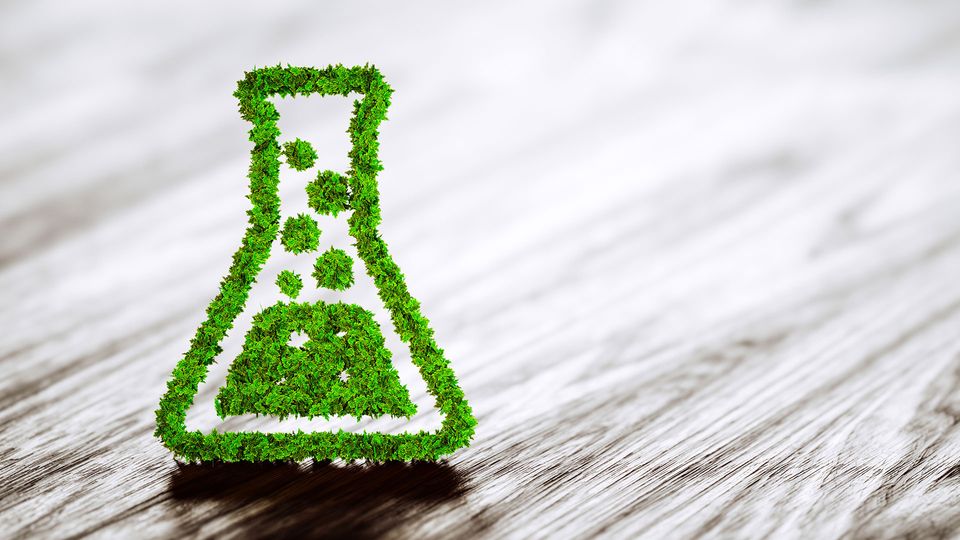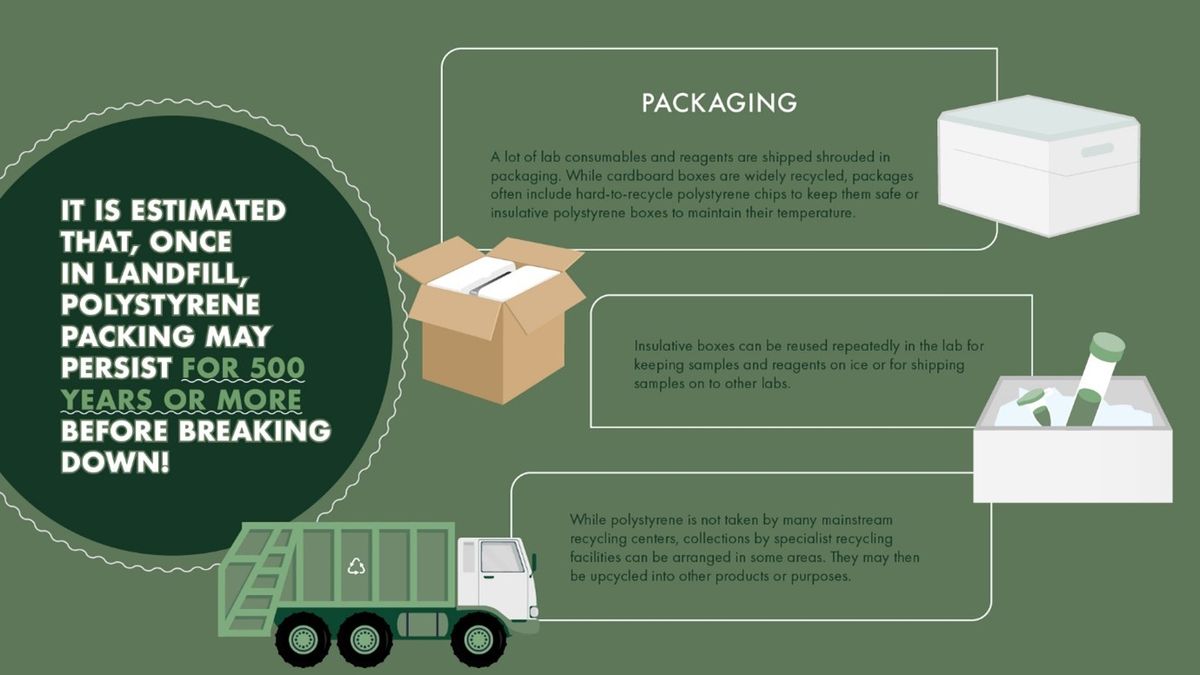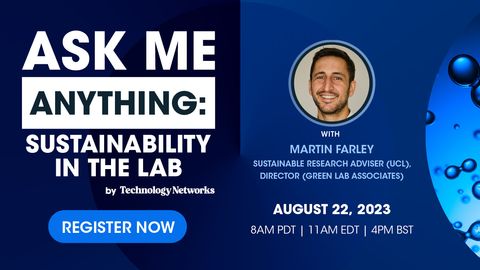Integrating Sustainability Into the Lab With Martin Farley
To address the climate crisis, the scientific community must take action to reduce single-use consumption, manage waste efficiently and overcome financial barriers to sustainability.

Complete the form below to unlock access to ALL audio articles.
Martin Farley, sustainable research adviser at UCL and director of Green Lab Associates, is an expert in lab sustainability. He started a career in research, however his personal and professional interest in sustainability led him to take an alternate career path focused on making labs more sustainable. He established the consultancy Green Lab Associates to help researchers to reduce the energy and resources they use in their workspace. He also consults various institutions, helping them develop greener practices.
Farley was invited to Technology Networks’ Ask Me Anything session to answer your questions about the future of sustainability in research and laboratory practices.
Lucy Lawrence (LL): Is it ever possible for a lab to be 100% sustainable since there is so much plastic waste?
Martin Farley (MF): We don’t know how to do net-zero science yet – we don’t know how to achieve net zero for most things yet – but we do know how to vastly mitigate the impacts. I think that’s the way to look at it: while we don’t have all the immediate solutions, we have a lot of immediate actions we can take.
I don’t think science inherently will ever be absolutely net zero, but that’s not to say that we should stop doing it.
Maybe it will be one day, a lot of it depends on our energy sources and the energy mix, and there is a lot we know we can do now.

Figure 1: Reusing and recycling polystyrene packaging. Credit: Technology Networks, adapted from Lab Sustainability.
LL: What would your dream green lab look like?
MF: A dream of mine is to fully understand the carbon impacts of the different processes we do – to understand where the hotspots are for when we want to take action around sustainable labs. The dream green lab would involve suppliers having full transparency on the manufacturing impact of what they produce for us, being motivated not just to sell us single-use products but also to take part in addressing the sustainability impacts of some of their processes without damaging the research or clinical outcome.
It would also involve a full integration of sustainable practices and targets. When learning at the university level, somebody would teach you that your freezer uses as much energy as a house, or that your fume cupboard uses as much as two to three houses or that there is an impact from the gases that you're using.
Because, at the end of the day, the folks that are going to be working in these labs are the ones best placed to know where they can mitigate and find wins around sustainability without compromising the research.
It would also mean integrating standards, it would mean suppliers are fully invested, and that there's a level of transparency and awareness that's commonplace, similar to what we’ve done with safety in the lab.
LL: Could you explain what the lab efficiency assessment framework (LEAF) is?
MF: The best analogy is that if you want to make your lab safe, you use a health and safety standard. You don’t start from square one, you have a standard that’s set and gives you actions and targets to adhere to. And that was the idea behind LEAF – to give people a standard approach to sustainability to make it more accessible. Laboratories that sign up are given sustainability actions to work through and, depending on the criteria that they meet, they are certified with a bronze, silver or gold award. There are also calculators within the tool that allow people to estimate some of their carbon and financial impacts.
LEAF is intended to mimic what we’ve seen with gender equality in science. It was mandated that if you wanted to get funding, you had to achieve a certain level within the Athena SWAN framework to make these changes happen quickly. It was great that gender equality wasn’t made voluntary, and I would argue that that’s something that we need with sustainability now.
LL: What steps can a lab take to properly manage e-waste generated from old equipment?
MF: There's planned obsolescence by a lot of the large companies that provide equipment. But, if your IT department will allow it, there are third party providers that will take over contracts and warranties to extend their lifetime. If a piece of equipment needs to go out the door, then I would recommend looking at third parties who can take the equipment and pass it on. In the UK, for example, there's providers such as UniGreenScheme.
LL: Are green labs more expensive to run?
MF: This is a common feeling and concept, I would disagree with it, but it depends. One of the challenges to sustainability is our financial systems. Currently, our pots of money are all spread in ways that work for accountants but don't work for sustainability.
Let's take the reuse of consumables as an example. Somebody's going to have to pay for somebody's time to go and wash them, and you might see energy consumption go up. However, in a university, that energy consumption is paid by a separate department than the ones that pay for the technician and the consumables, so that removes some of the incentive. We assessed the costs of reusing consumables. We showed that, overall, the cost of reuse was comparable to single use, if not less, depending on the consumable. The issue is how to incentivize it. Labs often don't pay for energy, so why should they pay for a piece of equipment or take more time out of their very busy lives to do something that will save energy if they don't see that incentive?
If we were to remove some of these financial barriers, we would see that sustainability in labs is actually about using equipment for a longer lifespan.
You can't buy your way to sustainability, so it's about reusing or repairing things more, which overall should save money.
It's also about sharing resources and making more data more accessible. If we were to invest in better sharing of data systems, it's an upfront cost, but we get more out of the data in the long term. For example, the brain banks across the UK use a common sample management system, which means that they're all aware of each other’s samples. It is a wonderful model but, currently, we haven't put the incentives in the right place to invest in these systems.
Another example I want to give is the grant system. If you win a grant, there's a limited time when you can spend it. If you don't spend it by the end of the year, the accountants or department leads might take it back. Why haven't we figured out a system to incentivize underspend on grants? There are a few wider systems that make it tough right now.
Financially, I would argue that overall, if we're sharing our resources appropriately, sustainable science would be so much cheaper. There are a lot of examples, but it requires looking at the system as a whole, which is sometimes challenging on an individual basis with the way financial systems are set up.
LL: What if we were to overlook sustainability in the lab entirely?
MF: Science is growing exponentially, at a much faster rate than the global GDP. There’s the largest number of scientists we’ve ever had, so the impact of it is growing exponentially as well. We have to take part.
Most of the carbon impact we have is through the consumption of materials, and it's a whole chain: the embodied carbon of where the material comes from, the shipping, the manufacturing, the consumption, the usage. I wouldn't say that we can just ignore it.
We want to do more science that helps us understand how to address climate change, but not all science is equal. A lot of science enables climate change and enables consumption, so consider the type of science you do long term. Science is a tool, but it's as good of a tool as we make it. It can help us address climate change, or it can enable it as well.
Martin Farley was speaking to Lucy Lawrence, Senior Digital Content Producer for Technology Networks.




